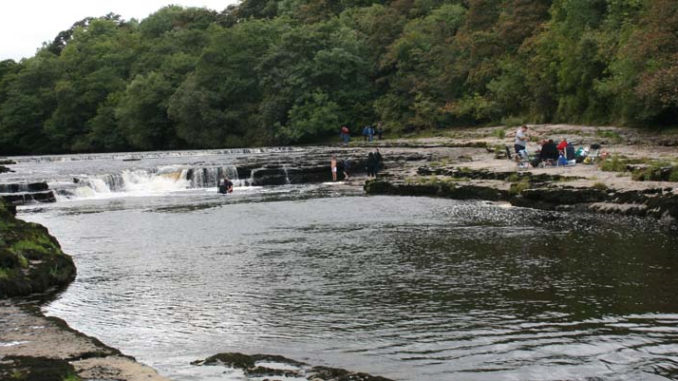
A group has been formed to fight against pollution in the River Ure.
Stop Ure Pollution (SUP) was launched at a public meeting at Leyburn Methodist Church Hall on Tuesday evening.
Over 70 people attended the meeting called to discuss the issue of pollution, including raw sewage, in the Wensleydale river.
The chair of the interim committee of the Health of the River Ure group, Prof Richard Loukota, said the aims of SUP were to stop the discharges of raw sewage when storm conditions were not occurring; to upgrade water treatment facilities; and to identify pollution caused by the run-off from farms.
One man asked how they could bring about change when agencies such as Defra and the Environment Agency were so underfunded and under-manned.
He said: “You can collect as much data as you like but when you look at Defra they don’t have the resources because of the cutbacks.”
He also wondered what could be done if polluters weren’t breaking the law.
Prof Loukota replied that there were instances when polluters were breaking the law and Ofwat has the power to impose unlimited fines.
“They need to be pushed to do so,” he said.
Sheila Toper from Aysgarth said: “We have got to start somewhere and the more voices raised the more successful we will be.”
When asked how soon data could be collected Charlotte, from the Yorkshire Dales River Trust (YDRT), explained how volunteer citizen scientists could assist with sampling the river water throughout its length and data hot-spots could then be identified.
“The data collected by volunteers will be more specific and there will be far more testing along the river.”
Along the Rivers Wharfe and Nidd, volunteers had tested between 30 and 40 sites, she said, adding: “That gives you a far greater picture of where the pollution might be coming in.”
She explained the YDRT will now work with the SUP volunteers to identify testing sites, hold training days for volunteers and organise a date for the first sampling by the end of August.
Since the meeting about the health of the river on April 30, sponsored by the Association of Rural Communities, over 40 people have volunteered to help with water sampling.
Some at the meeting questioned the independence of the testing of the water samples as the cost of this would be met by Yorkshire Water.
Charlotte confirmed that the laboratory was independently accredited and has been used by YDRT for both testing of samples from the Wharfe and the Nidd.
Prof Loukota pointed out that testing water samples was very expensive and it will take time for the new group to build up funds.
He said he had attended Save Our Swale meetings to learn from them about setting up such a group.
Both he and Charlotte emphasised that this needed to be a collaborative effort, working with not only Yorkshire Water and the Environment Agency but also the Yorkshire Dales National Park, and other river groups to be effective.


Be the first to comment